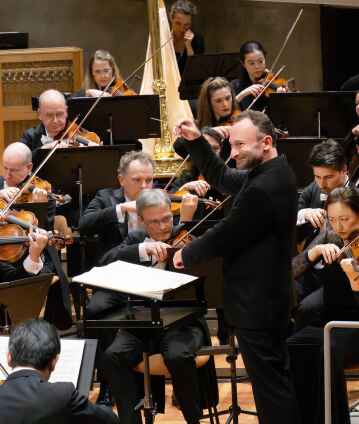Kirill Petrenko conducts “The Miraculous Mandarin” and “Petrushka”

Chief conductor Kirill Petrenko presents dance music from the 20th century: in the ballet The Miraculous Mandarin, Béla Bartók employs expressionistically sharpened sounds to describe the mercilessness of city life, in which humanity no longer has a place. Igor Stravinsky’s Petrushka tells the bittersweet love story of a puppet set in the midst of a bustling fairground. Finally, Leoš Janáček celebrates the melancholy yet lively folk music of his Czech homeland in his Lachian Dances.
Following Béla Bartók’s The Wooden Prince, Kirill Petrenko turns his attention to Bartók’s ballet suite from The Miraculous Mandarin. As different as the two works are – one an enchanting fairy tale, the other a murderous contemporary drama – they are linked by the juxtaposition of mechanics and humanity: in the Prince ballet, the flesh-and-blood protagonist competes with his wooden counterpart, while in The Miraculous Mandarin, the hectic, noisy rhythms of the big city clash with the Chinese man’s longing for love.
In the ballet, the Mandarin is brought to a girl by her pimps – known as the three tramps. They try several times to kill the wealthy Chinese man in order to rob him. But the Mandarin defies all these violent attacks. Only when the girl embraces him is he able to die – in a moment of ultimate fulfilment and extreme pain.
The theatrical scandal that The Miraculous Mandarin caused at its Cologne premiere in 1926 – mayor Konrad Adenauer subsequently banned the “perverse” play – is reminiscent of the reaction to Igor Stravinsky’s Le Sacre du printemps a good decade earlier. Both works are now considered milestones of Expressionism in music. Stravinsky’s ballet Petrushka, which premiered in 1911, emerged from preliminary work on Le Sacre. The composer had “the persistent idea of a puppet that suddenly comes to life and, with the devilish arpeggio of its leaps, exhausts the orchestra’s patience to such an extent that it threatens it with fanfares. This develops into a terrible confusion, which culminates in the painful, lamenting collapse of the poor jumping jack”.
Kirill Petrenko opens this programme of ballet music with Leoš Janáček’s Lachian Dances. Composed around 1888 and revised in 1927, the composer adapted folk dances from Moravian Wallachia into his own idiom.
© 2025 Berlin Phil Media GmbH
Related interviews
Artists
Our recommendations
- 2022 New Year’s Eve Concert with Kirill Petrenko and Jonas Kaufmann
- Kirill Petrenko conducts Tchaikovsky and Rachmaninov
- The Berlin Phil Series: “Kirill Petrenko Live”
- Kirill Petrenko conducts Puccini’s “Suor Angelica”
- Season opening 2018: Kirill Petrenko conducts Beethoven and Strauss
- Kirill Petrenko conducts Mozart, Berg and Brahms at Suntory Hall in Tokyo